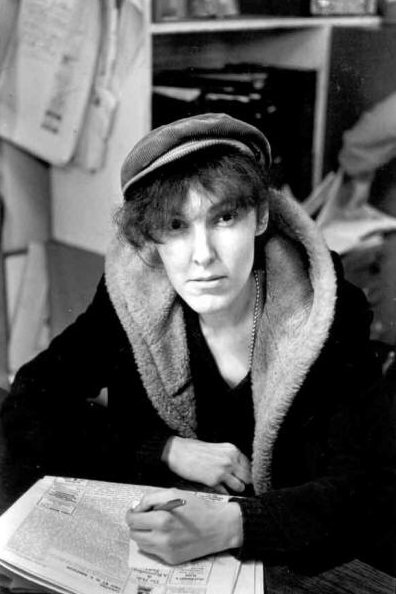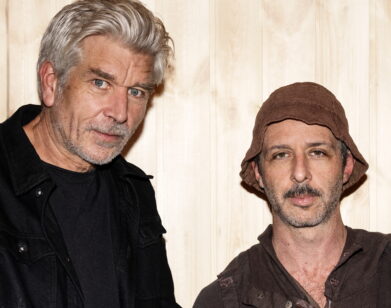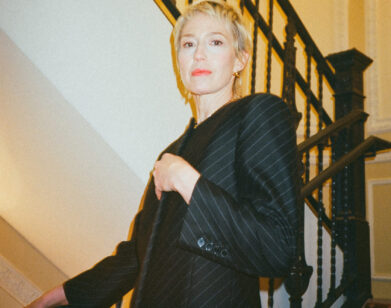Layers of SCUM: Uncovering Valerie Solanas

ABOVE: A PHOTO OF VALERIE SOLANAS TAKEN AT THE OFFICE OF THE VILLAGE VOICE
The counterculture revolution of the 1960s received Valerie Solanas as a radical feminist icon, a trailblazing queer figure, and a great writer—minus the complimentary spin. Some of the less complimentary descriptions of Solanas included “the Robespierre of feminism,” “a glitch,” “a woman who looked as though she had walked through a tear in space and time.” Valerie identified herself as a writer, and she left two masterpieces—the gender-bending play Up Your Ass, still as enigmatically ahead of its time in performances today, and the polarizing, poisonous, wickedly funny SCUM Manifesto (never S.C.U.M.), which Valerie obsessively revised throughout her life. It proposes the obliteration of men while deploring women who pander for “Daddy’s” approval instead of having a SCUM mindset: “Unhampered by propriety, niceness, discretion, public opinion, ‘morals,’ the ‘respect’ of assholes, always funky… SCUM’s still in the gutter of our ‘society.”‘ Valerie’s biggest regret after shooting Andy Warhol in 1968 came from the realization that her persona would remain permanently stunted, forever boxed into this mythical would-be assassin of the outrageously famous Pop artist. On the other hand, Valerie’s extreme social agenda gained national attention after this same assassination attempt, and the feminists of the liberally-leaning National Organization for Women [NOW] broke apart over the question of supporting Valerie, sending a shockwave through feminist history that is still felt today.
In the grip of schizophrenia-induced paranoia at the end of her life, Valerie vowed that she would write her own definitive, self-titled autobiography, which she predicted would sell at least 20 million copies. This autobiography would never be written (though some of Valerie’s predictions, including a Viagra-like pill and in vitro fertilization, did come true). Instead, sex researcher, therapist, and associate professor of Women and Gender Studies at Arizona State University, Dr. Breanne Fahs, spent a decade researching, interviewing, traveling, and collecting leftover zines like Holy Titclamps and DWAN, news clippings, DIY art mags, blurred photos, and half-recorded answering machine messages to write the biography VALERIE SOLANAS: The Defiant Life of the Woman Who Wrote SCUM (And Shot Andy Warhol).
Solanas was a knot of contradictions. She referred to men as “walking dildos,” despised patriarchal oppression, prided herself on her lesbian identity, and proselytized about locking men away in pens. When she found herself homeless, she often would asked male passerby for a dollar in exchange for a dirty word, which was always, gleefully, “Men.” Yet she engaged in hetero sex and relationships, was quite fond of several male friends, and maintained a sporadic but affectionate epistolary relationship with her father, who sexually abused her as a child. Her friendships were similarly hopeless. She rejected everyone close to her, lashing out angrily with threats of violence. In spite of this, she would continue to ask for generous favors. “I think it’s a really lonely place to be generally when you’re trying to break free of social traditions and norms and trying to do something new. Really, when you’re trying to live outside of your time, that’s lonely in and of itself,” Dr. Fahs says. “For Valerie, it was worse than even most radicals because she constantly rejected people who wanted to support her or wanted to align with her. And she identified as a writer. People who identify as writers are haunted by loneliness in lots of ways.”
Until she drifted off to the West Coast later in life, Valerie’s unshakeable, brazen confidence remained her most formidable asset, one that fueled her experience of life from the offensive side. VALERIE SOLANAS: The Defiant Life of the Woman Who Wrote SCUM (And Shot Andy Warhol) quotes Valerie’s close male friend, Jeremiah Newton, who says, “She was so sure one day the world would discover her and she would have the fame she so richly deserved.” Incidentally, Solanas wrote a version of the preface to Up Your Ass—the play for which Warhol took a bullet by refusing to produce—in an almost 21st century-style affirmation: “I dedicate this play to ME, a continuous source of strength and guidance, and without whose unflinching loyalty, devotion, and faith this play would never have been written.”
Over the phone, we spoke to Dr. Fahs about Valerie’s endlessly fascinating story, touching on radical feminist grannies, the scent of trauma, unexplained prison breaks, and inevitably, Andy Warhol.
HANNAH GHORASHI: What was your first experience of Valerie, and what was your reaction when you first read the SCUM Manifesto?
BREANNE FAHS: I remember really vividly the first time I read the SCUM Manifesto because I felt these incredibly deep, deep levels of humor in it, and I remember just laughing to myself really, really loudly, almost in this inappropriate way. I thought, “This isn’t a laughter of pure comedy, or the kind of laughter you have at comedy. It’s a laughter of that weird line that straddles between the absurd and the truth coming out.” Even at the time, I had never read anything like it, and I had never heard a voice that spoke like that and it really, really had a huge impression on me. I also think most women are—I still am, of course—still grappling with what you do with their own anger, or what you do with your anger at the way women are treated. I was a Women’s Studies major in college, so at the time I was really struck with trying to grapple with that too.
GHORASHI: Was that the first time you had heard of her?
FAHS: I had definitely never heard of her before; my first introduction to her was just diving straight into the SCUM Manifesto, so I had no other context. I think that actually shows in the way I approached this biography: I really think the SCUM Manifesto comes first, and Andy Warhol and all of the things that happened with Andy Warhol are secondary.
GHORASHI: You managed to track down a lot of people that she interacted with in her life—how was that whole process, and were people generally more hostile or receptive to the idea of you writing her biography?
FAHS: Valerie brings the most interesting, eccentric, hostile, and sometimes frankly crazy people into her orbit. I suppose one could even imagine a book about writing the book, because it was so absurd at times, and I had so many experiences that were just bizarre and full of anger. I encountered levels of anger that I’ve never encountered, ever. People screaming at me on the phone would be a common occurrence. And, of course, I interviewed a lot of radical feminists, and they were just amazingly inspiring and interesting. Here you are talking to all these women in their 70s and 80s, in the grandparent cohort, yet they are as radical as anyone I’ve ever met. These women are 80 years old with their cats and their soup, telling you, “I’m going to break it down for you here.” I don’t think I interviewed a single person who I would honestly consider mainstream or normal in any way.
GHORASHI: It seems as though she just wanted the world to give her the respect she had for herself as a woman, as a queer person, as a writer, etc.
FAHS: Yeah, her identities are just an endlessly fascinating conversation, generally. I really like thinking of Valerie as a destroyer, and how destroyers have a place too.
GHORASHI: They create things.
FAHS: Right, even certain religions worship destroying figures and destruction.
GHORASHI: Like Shiva.
FAHS: Right, because they have a transformative potential. We just don’t do that very much in our culture—we don’t appreciate or value destruction.
GHORASHI: I want to ask about Valerie’s sexuality—you never identify her as bisexual in the book, though her sexual history and relationships technically could be considered in that way.
FAHS: Valerie’s sexual identity is still so bizarre—it’s unable to be categorized according to the ways that we understand sexual identity today. We don’t have the lens, yet—I want to say the word yet, because that’s important. I don’t want to put words in her mouth, but I kind of feel like she would have hated people calling her bisexual in the way that we define bisexuality today. I think the politics of sexual identity have the potential to become a lot better than they are now.
GHORASHI: Yeah, there really isn’t a way for people to identify as gay or lesbian and also want to have hetero sex.
FAHS: Yeah, yet of course people do this all the time. I’m a sex researcher also, and I study a lot of behavior inconsistent with identity. Our identity categories aren’t as advanced as what we understand to be true behaviorally, so I love the reviews of Up Your Ass from 10 years ago, because they’re still saying things like, “Queer theory has nothing on Valerie.” The characters have these sexual identities that we literally don’t have the framework to understand yet.
GHORASHI: It’s like a preview of what culture will be in the future, too.
FAHS: Yeah!
GHORASHI: At the beginning of the book, you write about how Valerie was sexually abused by her father and potentially her stepfather, which seems to explain her misandry later. But she also wrote letters to her father as an adult and seemed to feel affectionate towards him. Is this contradictory?
FAHS: I’m curious about it. Trauma and violence do not equal these neat and tidy stories that I think people will want to have be true. The story I think people want to be true about Valerie is that she was sexually abused by her father, she then goes to hate all men, she then writes the SCUM Manifesto, shoots Andy Warhol, and dies lonely and suffering. I think, certainly, her spirited attention to issues of gender and equity far predate anything that happens with her father—I mean, it’s all messy, it’s really messy. I think the bigger story in there is the story about how trauma imprints on people in these particular ways that come out differently than we think. It’s always interesting to me that people seem a lot more obsessed with the notion of her sexual abuse than of stuff like the trauma of having her uterus tampered with when she was in a mental hospital, or the trauma of not being able to parent her children, or the trauma of not having enough food or not having shelter on a daily basis for most of her adult life.
GHORASHI: It reminds me of how towards the end, someone said that she had a very distinct smell all the time. It wasn’t a bad smell, but it was hers and it was very strong, like these traumas she always carried around.
FAHS: Yeah, that was Margo Feiden who said that. People talk about Valerie in those sensory ways. A lot of people talked about the quality of her eyes, and how her eyes were fiery, determined, fierce. I think one of the women described her as a hot wire, like a wire that popped off of a pole and is flying around. [laughs] And I think Valerie was smarter than people give her credit for sometimes, too. I mean, literally, we know that her IQ was in the 98th percentile. I was super excited when I found that, because I was thought, “Ok, now we’re not just talking in some vague sense.”
GHORASHI: Now there are facts.
FAHS: Yeah, like madness and genius going together—it’s actually true in Valerie’s case. I think that also means we have to imagine that she understands her work in more complicated ways than someone who is simply angry. At one point she says, “No, the SCUM Manifesto is a literary device and it’s more of a mentality.” At times I think that was true for her, and at other times I think it wasn’t.
GHORASHI: Why do you think Andy Warhol was interested in her?
FAHS: I love the odd relationship that they had. I think they are such polar opposites in certain ways, and almost identical matches in other ways. You have Andy Warhol operating in this mode of “I will be distant and detached, and coolly observant of everything.” Then Valerie, like I said, is this live wire. She is total passion, earnestness, hotness, like heat. I think both she and Andy had a lot of similarities—they both come from this working-class background, they are running away from a certain kind of life that they grew up in. Certainly they share some kind of queer identity, somehow. There are all these things that seem like they should have felt more aligned than they did, but temperamentally they were just so different. This creates this, I think, one of history’s most absurd and bizarre pairings.
After the shooting, Andy acts like Valerie shooting him was in her nature, and therefore she can’t be blamed for it, and therefore he can’t be all that angry at her. Valerie was kind of apologetic and sheepish about the shooting, but at the same time she said things like, “You’re just trying to get publicity for yourself by pretending to be kind to me,” and other blasphemous statements like, “I should have done target practice.” She also realizes the cost of shooting him and how it kind of derailed her bigger purpose as a writer. It placed her in history as the woman who shot Andy Warhol.
GHORASHI: Even though they were both queer, how much male privilege do you think Andy Warhol exercised in the creation of this story? She’s still defined by him, to most people.
FAHS: He’s a fascinating example of someone who didn’t identify this really macho, stereotyped masculinity, but nonetheless, that sort of cool, distant, detached sort of framework that he brings to everything gets so much more rewarded. In part because he’s a man, but also in part because that position is just so much more rewarded than people who are more like live wires, who are hot and passionate and upfront. And then, of course, the Factory was filled with wealthy, women socialites, while the men were allowed to be from all sorts of backgrounds. Those women were like zoo creatures, I’m sure, to Valerie. Exotic, feathered animals. There were not working-class women in the Factory, or women of any sort like Valerie. In the debates I had with my publisher about the title of the book, I did not want Andy Warhol in the title, and they said, “We need to have that in there, because it locates the story for people.” So we ended up compromising and created this parentheses, but I was really conscious and purposeful on my part because I really did not want Valerie’s life designed according to her relationship with Andy Warhol or the moment of the shooting.
GHORASHI: What do you think Valerie’s general effect on the evolution of feminism was?
FAHS: The fact that the debate about Valerie fractured the National Organization for Women [NOW] seems incredibly important. The liberal wing of NOW position is saying, “Get away from Valerie,” and then the radical wing of NOW is saying, “No. She’s a woman, she needs our help. She’s finally done something about the rage we all feel, why shouldn’t we consider this a feminist act?” That creates such a rift in the National Organization for Women in 1968 that it splits them in two. All of these women leave and form radical feminist groups, and that happens because of the fight over Valerie. Radical feminism is sort of born in the shadow of Valerie’s actions and writings.
GHORASHI: I’m really curious about this last question: You mention in the book that Valerie escaped from prison and, I think, a mental institution. Do you know how she did that?
FAHS: No one knows this. This is one of our big mysteries. There is no document that I’ve been able to find that details in any way how she got out, or whether she did it as a group. And these are not easy places to escape from.
GHORASHI: Yeah! That’s what I was thinking. I couldn’t even imagine.
FAHS: I’m glad you brought that up because in the last couple weeks I thought, “I should have maybe hit that point a little harder in the book.” It’s super interesting, how she escapes from some of the places that are the most difficult places to escape from. And multiple times. Even when you try to know everything about Valerie, there are still these big questions, and these myths that can be created. I think that’s why there are novels and plays being written using Valerie as inspiration. There is hardly anything that I have ever worked on that I’ve found more interesting than Valerie’s story, and it’s kept me interested for a decade. I have no idea, is the answer to that.
VALERIE SOLANAS: THE DEFIANT LIFE OF THE WOMAN WHO WROTE SCUM (AND SHOT ANDY WARHOL) IS OUT NOW.






